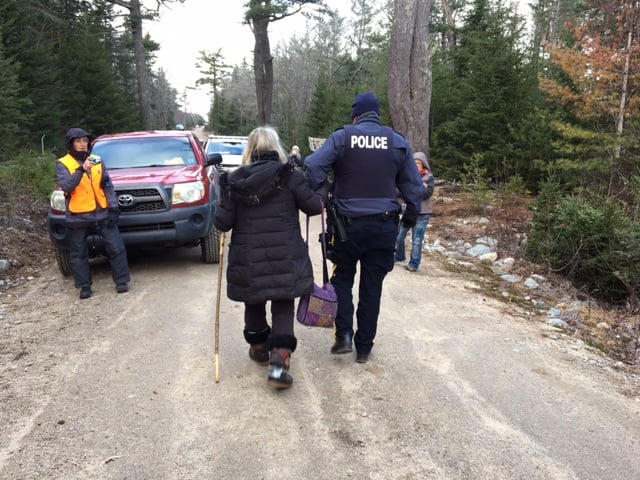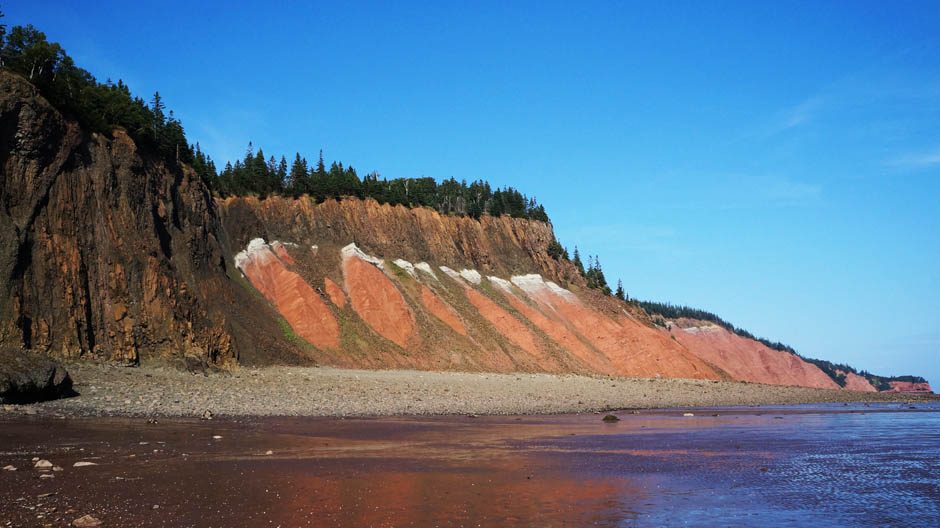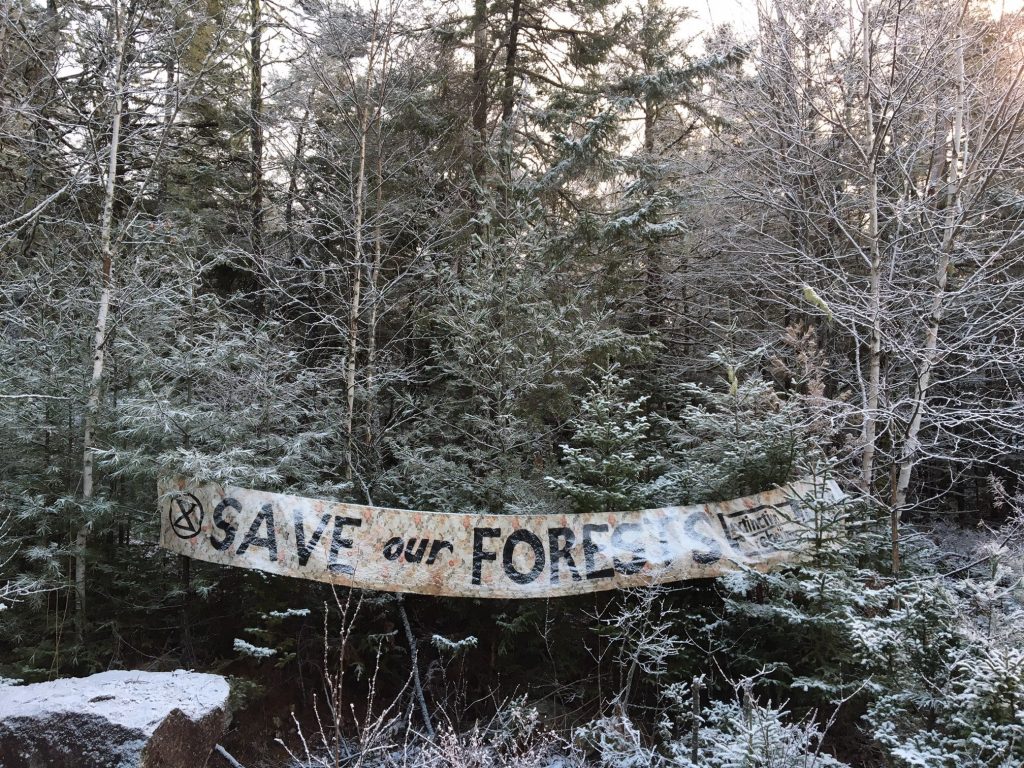On Annapolis Royal & Area – Environment & Ecology (Public Facebook Group)
- Twelve Days of Action Initial Post (26Dec2020)
- Twelve Days of Action Day 2
- Twelve Days of Action Day 3
- Twelve Days of Action Day 4
- Twelve Days of Action Day 5
- Twelve Days of Action Day 6
- Twelve Days of Action Day 7
- Twelve Days of Action Day 8
- Twelve Days of Action Day 9
- Twelve Days of Action Day 10
- Twelve Days of Action Day 11
- Twelve Days of Action Day 12 (7Jan2021)
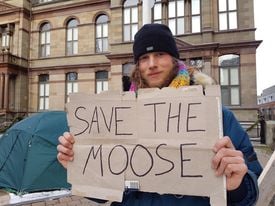 AND, Jan 7, 2021: A New Year of Action – Day 1 AND, Jan 7, 2021: A New Year of Action – Day 1All was not lost, for the very next day the youngest camper set up his tent, there in the city on the Grandest Parade, not so far from the Supremest Court where the Judge who had ruled the Minister most grievously at fault said this, this is what she said: “Unless someone like you cares a whole awful lot, nothing is going to get better. It’s not.” Dr. Seuss, The Lorax |
From Day 1
2020 has been a hard year as our government here in Nova Scotia has handled one crisis well and failed miserably on others. This government has used COVID as an excuse to avoid democratic scrutiny. Fortunately, citizens have refused to be silenced. This post is kicking off our second annual 12 days of activism celebration with a focus on actions involving Annapolis County Extinction Rebellion. In all these actions we teamed up with other groups such as Stop Spraying & Clear-Cutting Mi’kma’ki. It would be great if they too could post their highlights. We are all in this for the long haul.
So to kick the year off, on a frigidly cold day in February, we gathered on the Causeway in Annapolis Royal in solidarity with the Wet’suwet’en.
Their struggle continues as the Coastal Gaslink builds its pipeline on Unist’ot’en territory. This is from a Nov 30th letter by Wet’suwet’en women to to Dr Bonnie Henry, BC’s Chief Medical Officer: “Making a conscious decision to bring transient workers into our territories and communities is telling us that the economic gain of the province or state is more important than our language and cultures. You are telling us that the economic gain of the province is more important than our lives. Your behaviour and attitude facilitates the states’ genocide of our people and lands.”
The need for solidarity continues. Stay up to date by following https://www.facebook.com/wetsuwetenstrong/
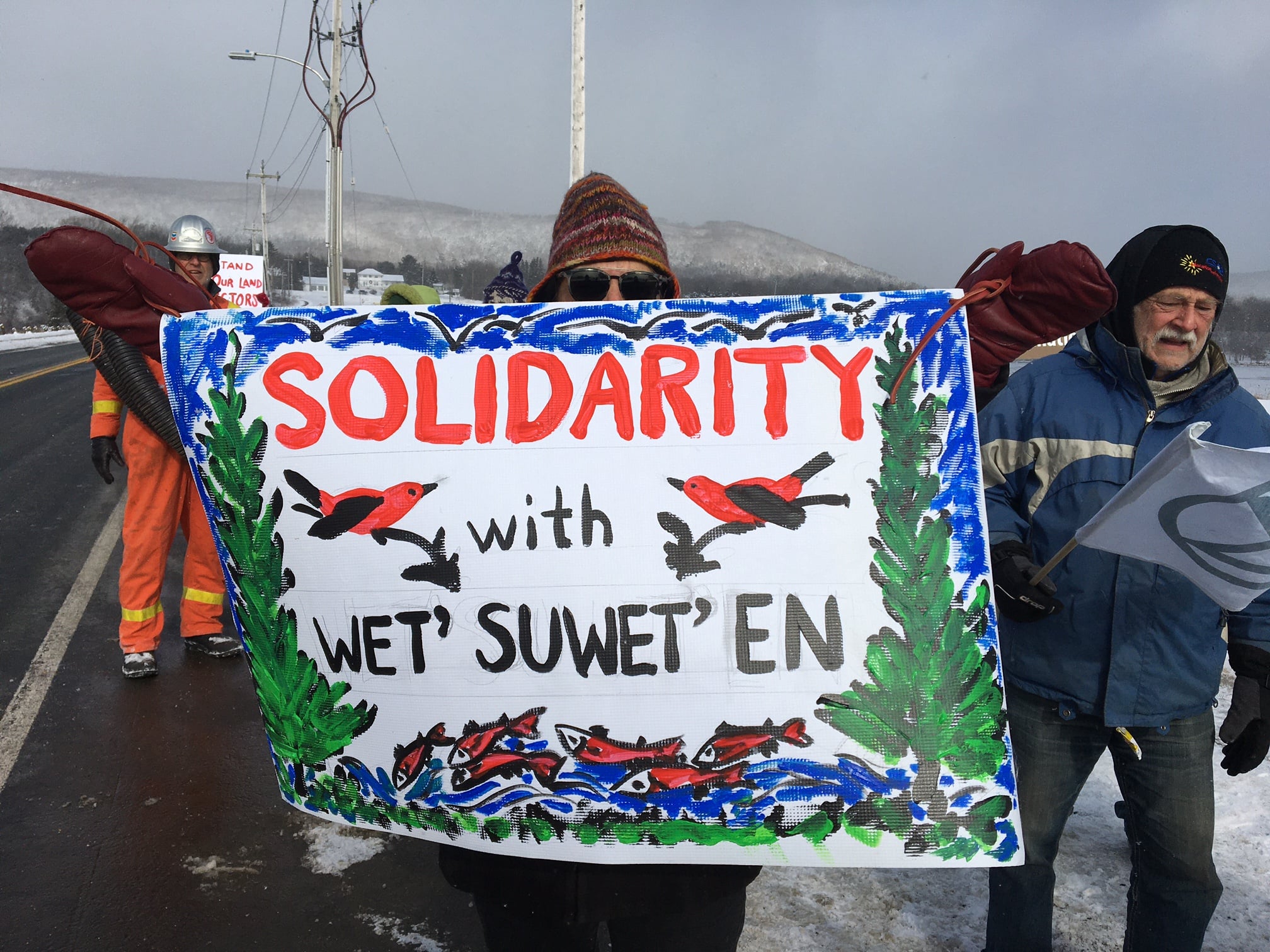
From Day 2
Owls Head protest in Halifax, February 20th.
A year ago we learned — through a CBC Freedom of Information Request — about the backroom deal to sell off publicly owned coastal land to a private developer. Owls Head, a 700 acre headland, long earmarked for protection, includes extensive coastal access, a rarity in Nova Scotia where most of the coastline is privately owned. Now we know that part of the deal was that our government, under conditions of strict secrecy, would sell the land at the undevelopable land price of $306 per acre — to an outfit whose sole reason for buying the land, as the government well knew, was to develop it. Owls Head contains a globally rare ecosystem. Its coastal barrens are home to several endangered species. Our government apparently sees nothing wrong with turning them into pesticide drenched golf courses. Thanks to a judicial review filed by Bob Bancroft and Eastern Shore Forest Watch the property sale has stalled — for now.
Even before COVID this government’s penchant for secrecy, its indifference to its obligation to protect endangered species, and its cavalier treatment of publicly owned land was obvious. Now it is actively avoiding democratic scrutiny. With the legislature shut down, the opposition parties have been denied opportunities to comment on this government’s activities. It is up to all of us to keep watch.
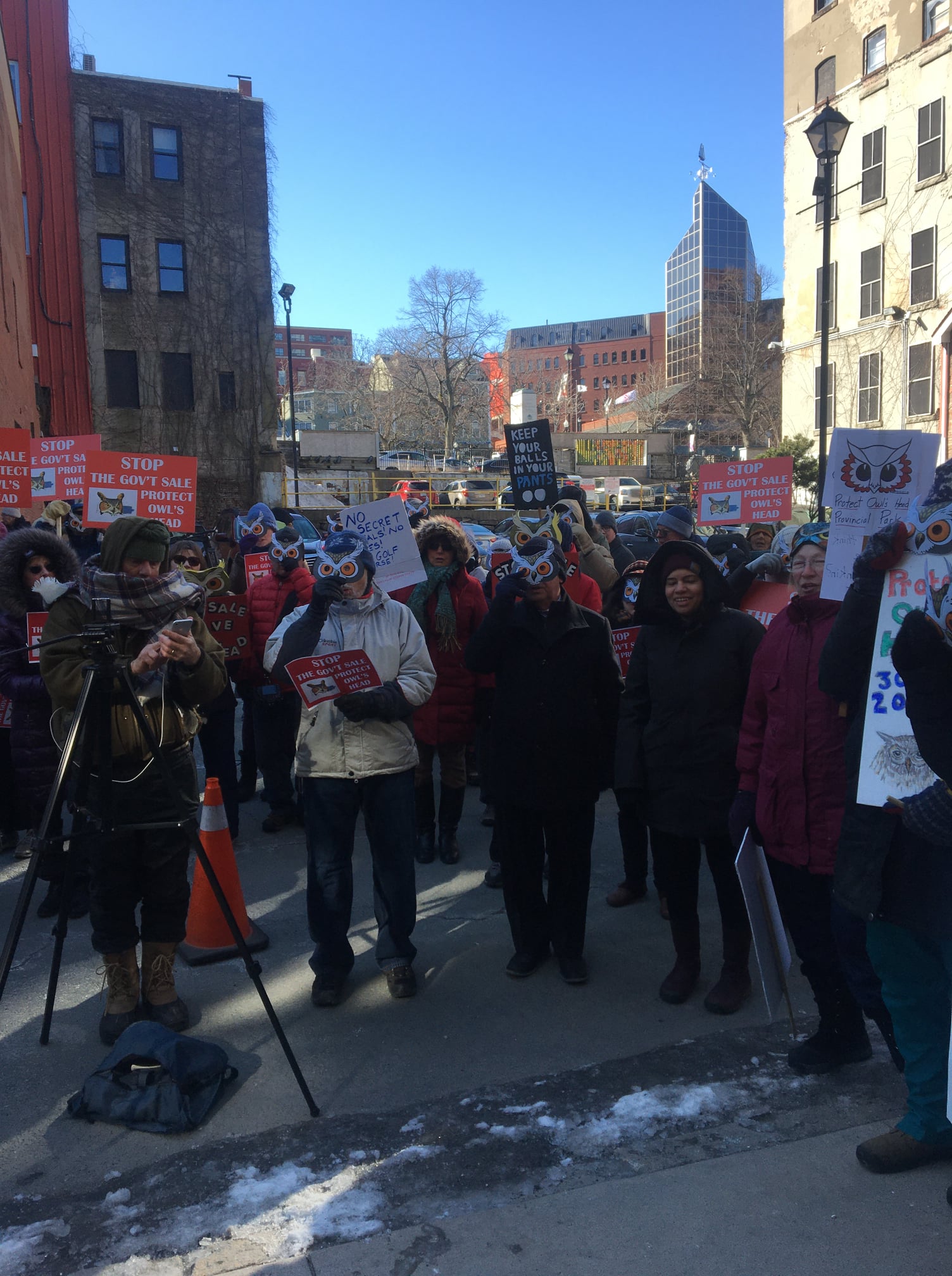
From Day 3
In September encampments sprung up on clearcuts in Kings, Annapolis and Hants Counties. All the clearcuts were on private land and all had been approved for aerial spraying with the herbicide Glyphosate by Nova Scotia’s Department of Environment.
Citizens camped out on the lands, putting up canopies painted with the words ‘Don’t Spray Us’. Some owned land nearby, some were members of Extinction Rebellion chapters, others belonged to the Facebook group ‘Stop Spraying and Clearcutting Mi’kma’ki.’
On the North Mountain, then the South Mountain, then in Hants County, aerial sprays were cancelled. None of the site we occupied were sprayed; all of the others were. 615 acres out of 3700 protected, for 2020 anyway. It’s a start.
On a sad note, Bob Mertens who came and camped with us in Hants County was killed in an accident while riding his bike a week later. We miss him and extend our sympathies to his family.
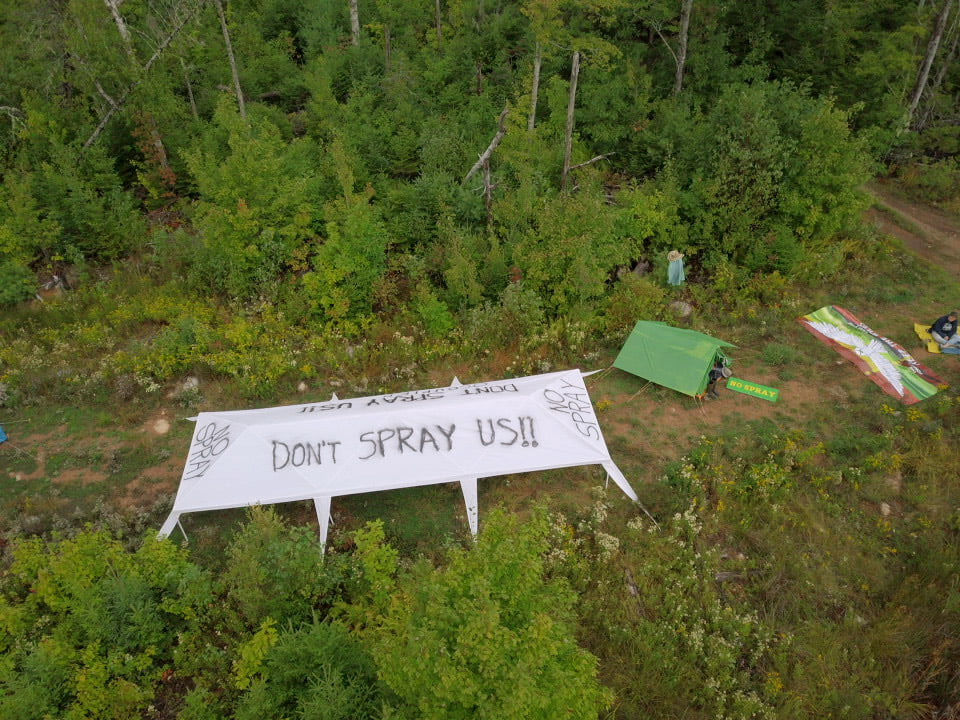
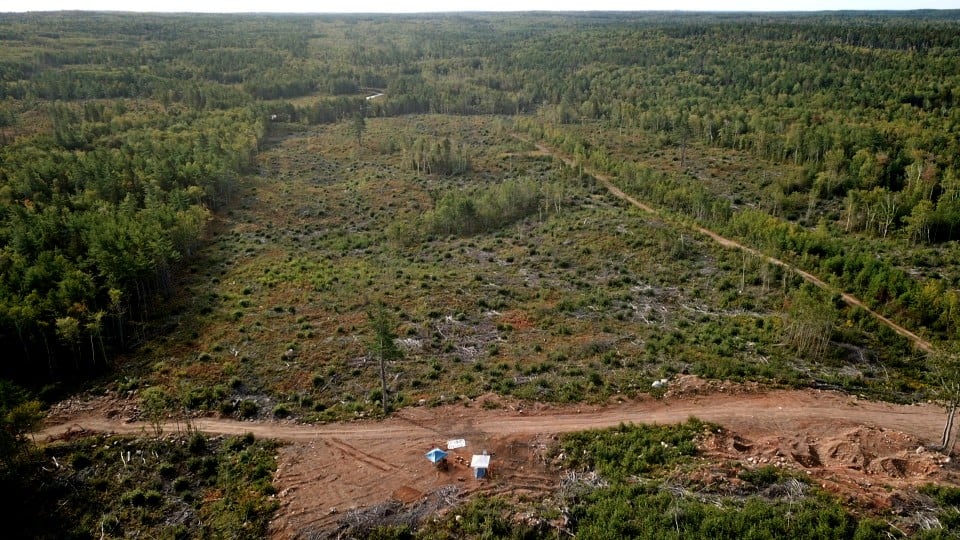
From Day 4:
The Moose Country Blockades began with news about sightings of the endangered mainland moose on Crown Land in Digby County, specifically on Crown Land bordering the Tobeatic Wilderness Area to the east and the Silver River Wilderness Area to the west. CBC aired an interview with a local man who found a fresh track while showing the journalist around. Meanwhile there were rumours that logging crews were headed into the area, ready to start clearcutting the forests the moose rely on.
Study of the province’s Harvest Plan Map Viewer revealed that 3300 acres of Crown Land in the area had been approved for cutting by the Department of Lands and Forestry since 2017. Almost all of it was to be clearcut. But the map did not show what had been cut already and what was still to be cut. There were certainly some huge clearcuts done in the last couple of years. But local information and some scouting suggested none of the parcels in the northern ‘pod’ of the Crown Land had been cut yet, and it seemed they were on a dead end road. More information was needed, including a route in.
Then came a phone call at 8 in the morning on Wednesday, October 21st. Word was, in northern Nova Scotia, that crews had finished cutting on Crown land there and were heading south to the New France area that day or the next. A handful of forest protectors packed up their camping gear and headed out in a hurry. Would they find their way to the logging road by Rocky Point Lake before the crews and their equipment got there?
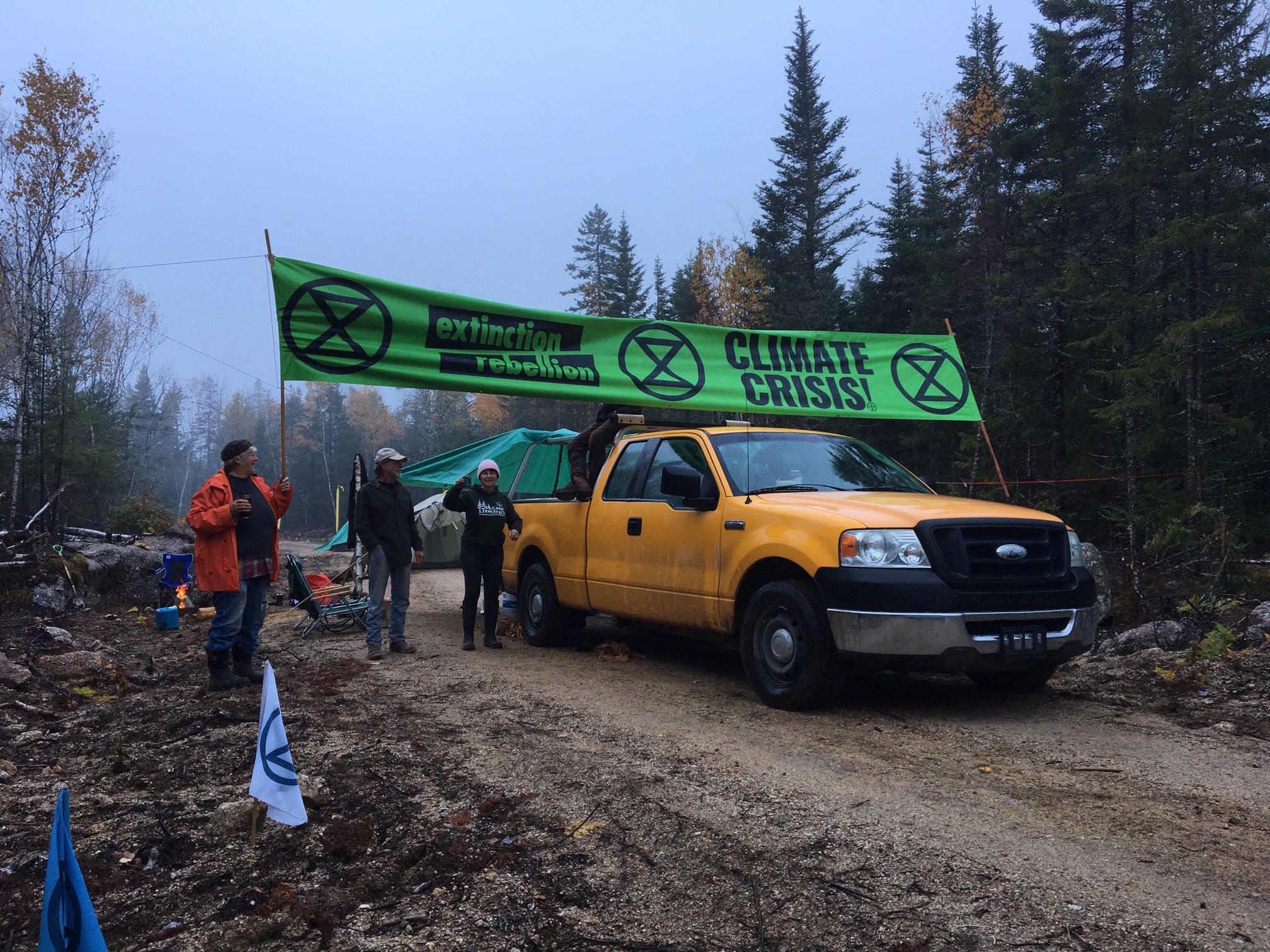
From Day 5:
The campers settled in at the Rocky Point Lake blockade and here, an hour’s drive on lumpy logging roads from paved road, with no cell signal, visitors began to show up. Not the logging crews, not the RCMP, just hunters and curious people. There was the man with long tangled locks who said he lived in the woods year round. After chatting a bit he said, ‘I one hundred percent support what you are doing here.’ He was the first to say that but he wasn’t the last. A great variety of hunters stopped by. Some wanted to get through to a trail cam or a bait station and the blockade was moved aside for them. Others just came to check the encampment out. Mostly they stayed for coffee, told the group about moose sightings and tracks in the area, talked with grief and anger about all the clearcutting happening on both Crown and private land. More than one described going to a spot they had visited for 30 or 40 years only to find the forest gone. They described getting lost in places they had known like the backs of their hands. Every one of them said, at some point, ‘I one hundred percent support what you are doing.’
Not every visitor was so encouraging. There was the fellow who drove up in his big black truck the first Saturday. He snapped a photo then backed up as two scary gray-haired women walked towards him. Rolling down his window he yelled, ‘You’ll have to move your vehicles next week,’ then tore out of there. The campers were relieved. It seemed they were in the right place.
The next day a young man showed up. He said he’d seen something on Facebook and was curious. His name was Janosch. He came from Germany but lived in Halifax now where he worked in the family business, something to do with real estate. The campers chatted with him, gave him a flyer, asked him to take a photograph of the group and post it on Facebook. ‘Oh, I don’t really do Facebook,’ he said and left. The campers looked at each other, puzzled.
Over the weeks they had other visits from people who weren’t exactly who they appeared to be, but by and large the visitors were remarkably supportive.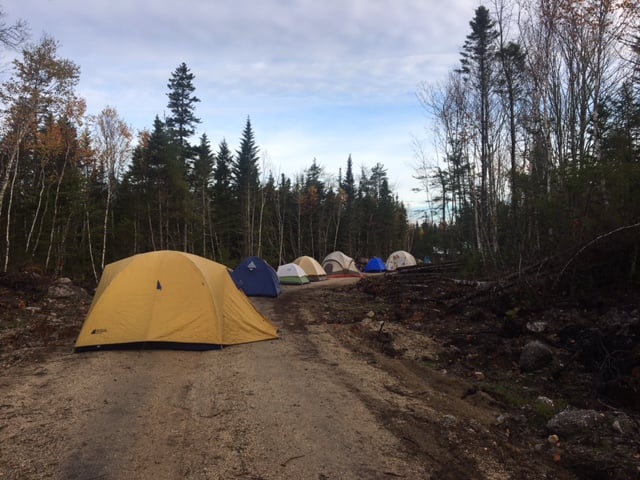
From Day 6
One day the campers decided to follow the great big new logging road that had been built. They followed it back past their encampment. The road ran between a beautiful lake and a water meadow. At the end of the road they came to a forest with tall pines and moss and many young trees growing. They had not seen many forests like this, where trees of different ages grew together. It was the sort of forest that moose need to shelter from the summer heat and the winter winds. They wanted to say to the moose, ‘Don’t worry, your forest will not be cut down, we promise.’ But they couldn’t. They could only say, ‘We’ll do the best we can.’
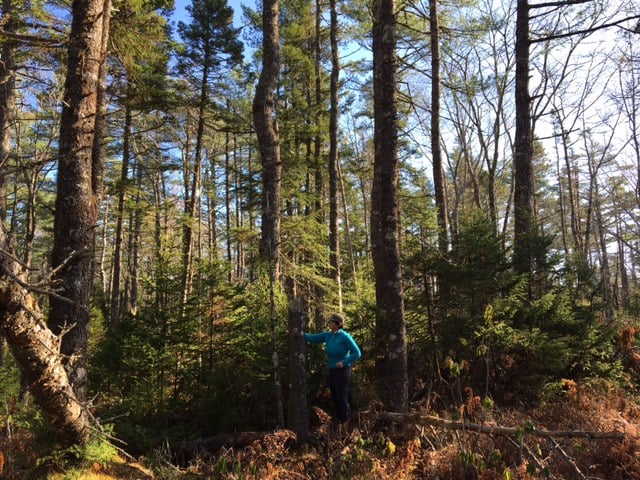
From Day 7
Winter came sniffing around the tents. On Snowman’s Corner the warning grew starker. The campers pulled their chairs closer to the fire. They dipped their toothbrushes in warm water to thaw them. Coffee never tasted better.
Out in the world people said they were brave but the campers were glad to be doing what they could. And people came bearing gifts. They brought kindling and croissants and chili and batteries. They brought water and honey and money and gloves. They brought stories and laughter. They brought prospectors tents and rappie pie and theories about how to put the tents up. They didn’t bring instructions or photographs.
But the tent went up and the firewood pile grew and spirits were good even though, far away in the city, a letter sat, unheeded, on a Minister’s desk.
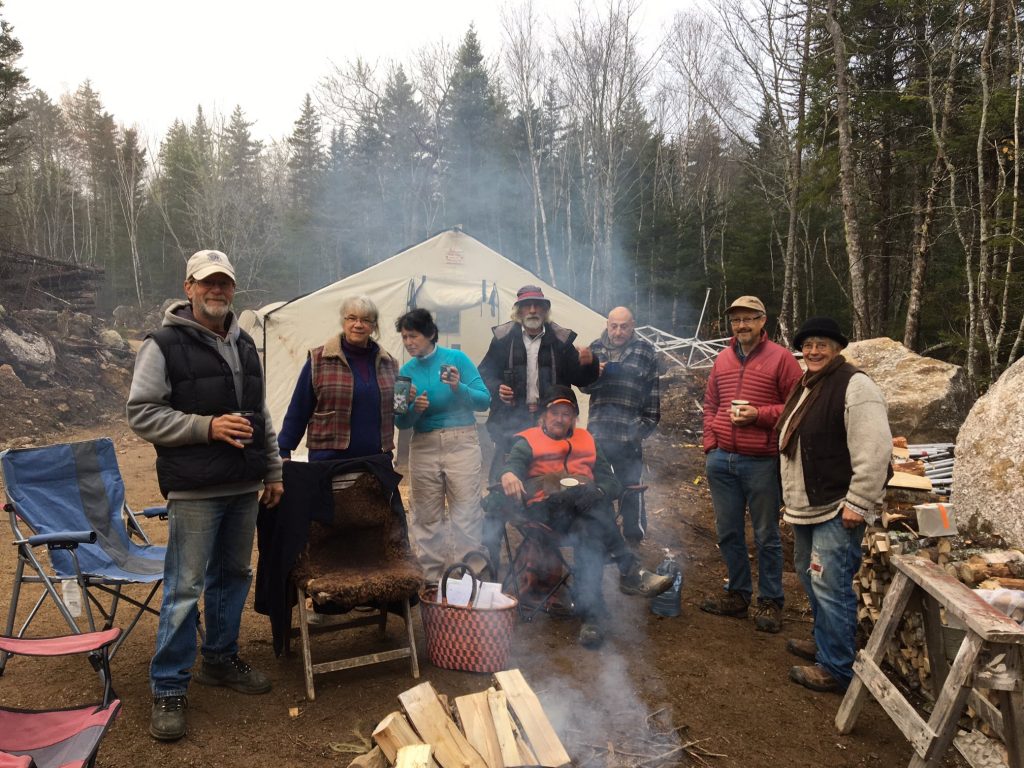
From Day 8
They were comfortable now, the campers by Rocky Point Lake, and they planned to remain and protect the beautiful forest. But they knew all was not well to the south. A sign had gone up at Snowman’s Corner.
Meanwhile, deep in the Ministry of Forest Removal, the letter sat, unread. Although the Minister did his best to forget it, it bothered him. Sometimes, when he walked past it, he thought he smelled spruce and snow and wood smoke. He called the tallest minister who told him: ‘Ignore it. They will go away.’ He called the Division of Fellers and Bunchers but they were too busy to take his call. What was it they wanted, those campers in the woods? He reached out his hand to the envelope but then he snatched it back as if it might burn him, that unread letter.
Back at the camp the campers welcomed a man who remembered. Once upon a time this man had worked for the Department that would one day, after many changes of name, become the Ministry for Forest Removal. He showed the campers the shield they used to wear over their hearts back then: Conserve Our Resources. He had fought so long and hard and almost alone to save the moose, this man, that his heart was broken. Still he was happy to see the campers. And some of them understood their hearts would break too and they too would fight on.
Together they went to the south to see what they could see and what they saw was not good. It was not good at all. They saw old roads and new roads and roads about to be built. They saw flagging and machines and ruts and cuts. Wherever a road went in, a forest came out. Together they stood and they turned slowly on such a road and as far as they could see, forests were gone. Only here and there a cluster of trees remained. They seemed to shiver in the wind. ‘Those are for the moose,’ said the man who remembered. ‘This is what they leave them.’
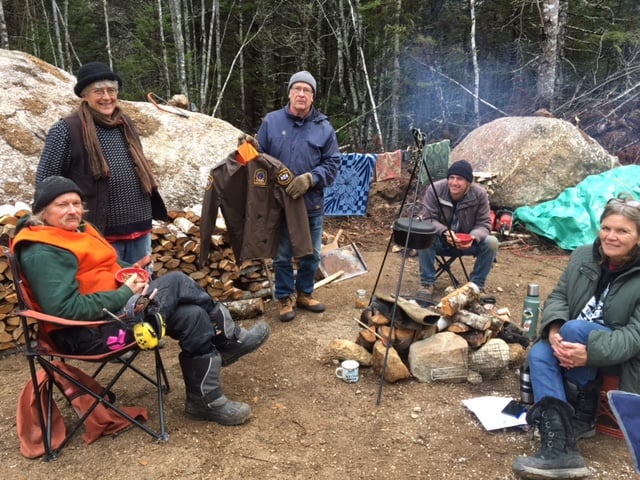
From Day 9
The campers could not forget what they had seen to the south. Though it was bad they knew it could get worse. We must do what we can, they said to each other, for the moose and the forest.
At night in that time the campers heard machines cutting long into the night in the kingdom to the west. They discovered those lands belonged to the young prince who had visited the campers at the beginning of it all. Who is he, they asked themselves, this prince? Does he know what is done in his name? Where the campers camped the land belonged to all the people but to reach that land the people must pass through the prince’s land. The prince, it was said, decreed they should not and his men piled logs and then boulders to close one way. ‘A gate,’ they told the campers, ‘will close the other.’
When the campers set up a new encampment to the south the prince’s men said, ‘You are gone then from the lands to the north?’
‘No,’ said the campers, ‘we are there and also here.’
It was true. And it did not go unnoticed.
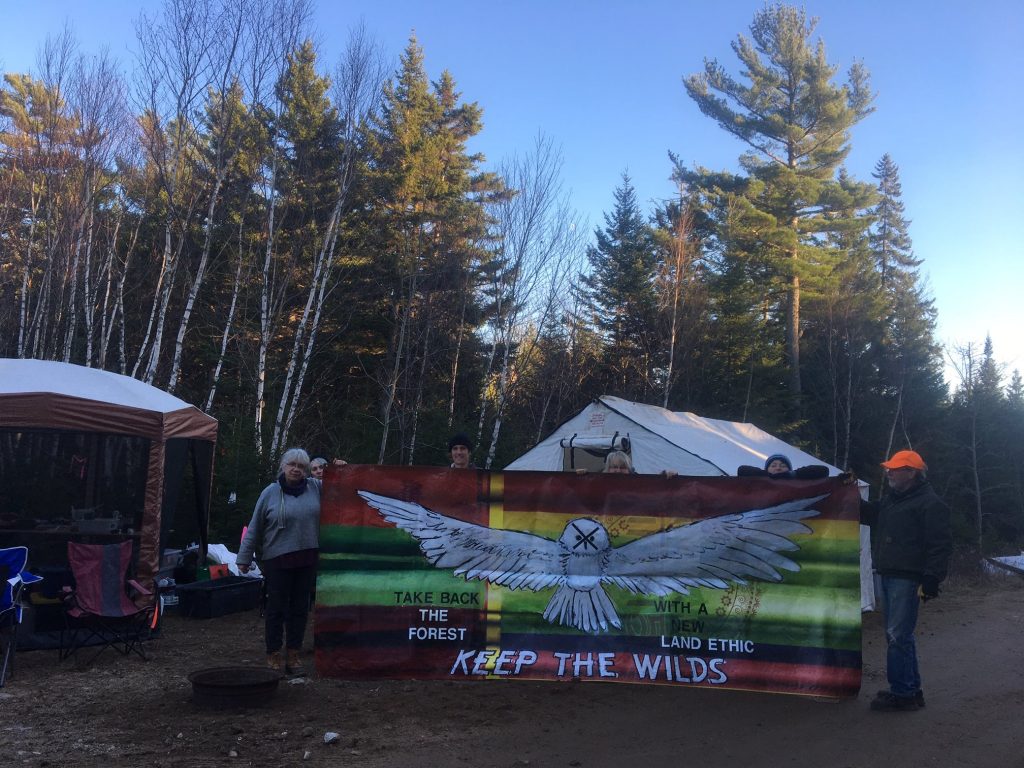
From Day 10
The very first night in that new encampment the reapers came and with them the policers.
Let us cut the forest, said the reapers, it is our right and besides it is no different than cutting corn in the field. Cut and come again. It is green. It is good.
No, said the campers.
Yes, said the reapers.
Oh, said the policers.
In the meantime in the city in the Ministry of Forest Removal, the letter sat untouched. The Minister no longer came to his office so he was not there when they arrived, the friends of the forests and the moose. We would like, they said, we would like the minister to agree to the campers’ request.
The staff at the desk looked at each other. Nobody knew what it was, this request. At last a friend said, They would like the minister to meet with one of them and with the man who remembers and cares for the moose.
Oh, said the staffers, this is no way to request a meeting. They must go through the proper channels.
And what are those, asked the friend.
They must write a letter.
Oh, said the friend and sat down.
No, said the friends when they were asked to leave.
After not very long at all the policers came and they arrested the friends and they carried them away.
Back in the forest the campers wondered, how can it be the Minister will not reply to our letter? Is the noise of the fellers and bunchers so loud in his office he cannot hear himself read? Or does he believe we are too few to count though we have two camps now and friends in the city and stories are told in the air, they are written on paper. Come, said the campers, to friends in the country, come and stand up for the moose. They came and they spread themselves out along the very long logging road where the second camp was. High in the cloudless sky a plane took photographs of all the people who had travelled to this place to tell the forest and the moose and the campers, we care.
It was at this time that the young prince’s men installed a gate across the only road left to the first camp. There, said the main man who was the very same man who drove up to that first camp in the first days and wound down his window and shouted, You’ll have to move your vehicles next week. There, he said, snapping shut the padlock. They’ll be out of there now.
The hunters were not happy with the gate or the logs or the rocks that blocked their way too. It is the campers’ fault said the prince’s man.
Oh, said the hunters, is that so?
The campers in the first camp did not go hungry and they did not give up even though the prince’s men piled more and more rocks in their way.
In the second camp the hunters visited too. They brought jerky and sausage and rumours of other routes the reapers might take to go about their business.
So the campers decided, let us move down this road to the Caribou River for it has only one bridge and the bridge is narrow. They set their tents among the trees and the river sang to them in the night and they had an idea.”
They set their tents among the trees and the river sang to them in the night and they had an idea.”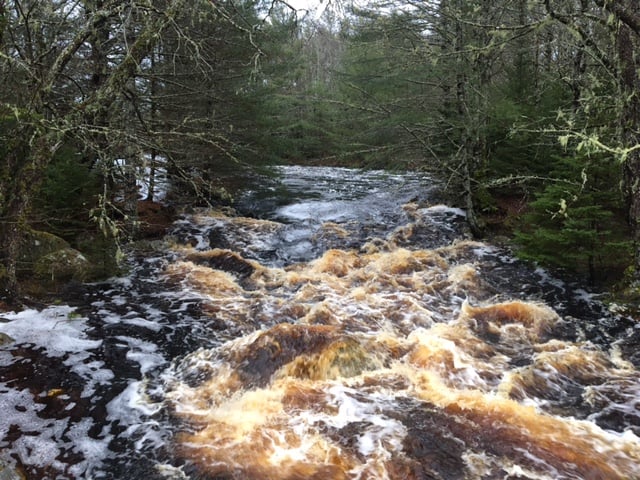
From Day 11
Drinking coffee as dawn coloured the sky, the campers discussed their situation. If the reapers and fellers and bunchers succeed, we will be banished, said one, from the people’s lands just as we have been banished from the prince’s land.
Another said, in the night the river reminded me, we will not be the first to be removed from the land so the forests can be cut and the animals driven from their homes. Perhaps we might ask them, those who belong to this land, for their help.
Yes, said the Grassroots Grandmother, I will come. I am glad you asked. On the banks of the Caribou River we will pray to the ancestors. I will come soon.
And she did and they gathered by the river in ceremony in the language of a people who had survived centuries of effort to erase them and their ways from the land. The campers reached into their hearts. They prayed to everything that is. Msit No’kmaq. All my relations.
Afterwards the Grandmother looked around and she smiled. The river is joyful. The land has heard your intentions.
We will do what we can, said the campers.
It is good that you are on the front lines as well, said the Grandmother. You are forest protectors too. Perhaps the policers will treat you better.
Hope so, said the campers and together they laughed.
Remember, said the Grandmother, you are not alone.
In the next days more and more people arrived at the camp.
Still the day came when a sheriff drove up to the bridge. He walked across the beautiful river. He nailed some papers to the big old pine that stood watch over the road. He looked at the campers then. Oh, he said, I had not realized you were so many.
Have you been to the other camp yet? the campers asked.
I have, said the sheriff.
And was the gate open?
The gate was open.
Oh ho, said the campers, it was open for you.
He went to his car and when he returned he handed out copies, enough for everyone. This is to tell you that you cannot do what you are doing.
Ah, said the campers.
Well, said the sheriff, I’ll be off then.
The campers looked at one another. The policers can’t be far behind, they said.
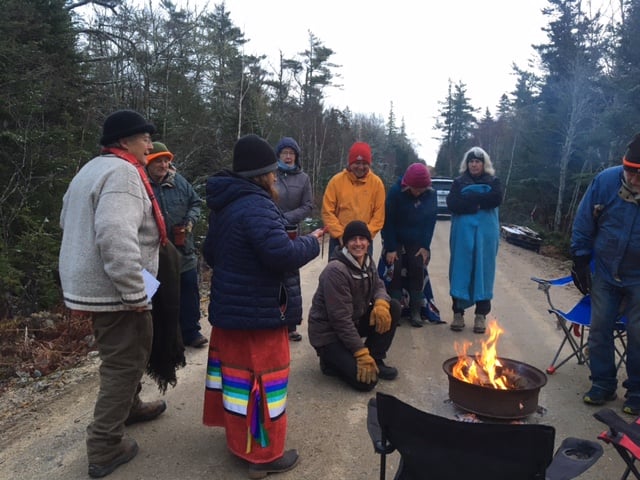
From Day 12
They did come, the policers, that day and the next and the next and each time they asked the campers, Will you remove your blockade?
And each time the campers replied, If we do that, who will protect the moose and the forest? It is the Minister’s job but the Minister is ignoring the law. A judge has found it so. It would be better if you arrested the minister.
On the fourth day the policers came again. They made a discovery. Santa Claus had come to camp.
You, said the policers, surely you are not going to get arrested.
Ah, said Santa Claus, there you are wrong. I know reindeer thrive on tundra but moose need forests. This is a gift I can give and I will. arrest me. Go ahead.
And they did.
One by one they arrested them all.
Now by Rocky Point Lake and on the banks of the Caribou River, no campers can stop the reapers. In the city the fellers and bunchers clapped the Minister on the shoulder. See, that was not so hard. You didn’t have to lift a finger.
What was in that letter? the Minister asked.
The fellers and bunchers shrugged. Does it matter?
Who will come to the aid of the moose and the forest now? the campers who could not camp asked each other.
All across this land people wrote letters, they sent emails, they made phone calls, they sent petitions.
The hunters came.
The Grassroots Grandmothers came.
Santa Claus came.
Perhaps the Prince? Perhaps we should ask if he will bar the way to the reapers and fellers and bunchers.
What about the Judge? said another. She quoted The Lorax.
Or perhaps the Chiefs of the Mi’kmaw, perhaps they will listen to them.
Haven’t so far, said another.
We can’t give up.
And we are not alone.
Their hearts were broken, it is true.
But all was not lost.
